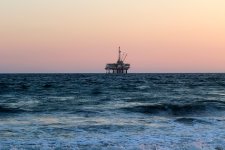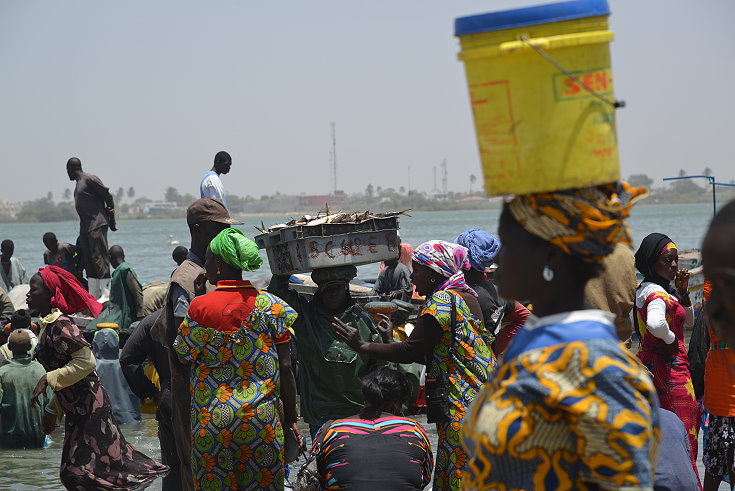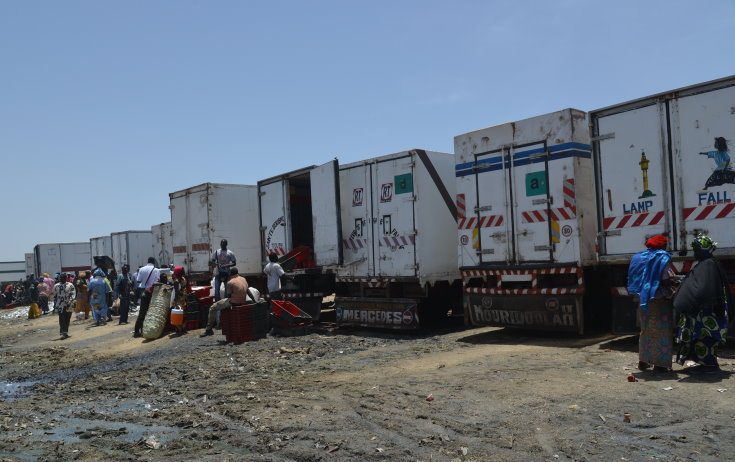When gas discoveries of 425 billion cubic meters were confirmed in 2015 for the coastal areas shared between Mauritania and Senegal, it spawned hope, such as providing electricity to the roughly 30% of the estimated 18 million Senegalese without access.

At that time, the local artisanal fishers who had brought money into the communities of Guet Ndar in St Louis and others, were already struggling with many hardships such a coastal erosion of their villages and loss of life at sea. Worst of all was, however, the competition by foreign industrial vessels and gradual loss of access to the most productive fishing grounds reachable with their open boats, locally called pirogues.
Saint-Louis, in the local language Wolof Ndar, island city, is a seaport near the mouth of the Sénégal River. It is also the rail terminus north-northeast of Dakar, Senegal. The island and city are connected to the mainland by a land bridge. Saint-Louis, founded in 1659, is the oldest colonial city on the western African coast and was the administrative capital of the French West African territories of Mauritania and Senegal. It was the Senegalese capital from 1872 to 1957 but afterwards lost some of its cultural and economic status. The inhabitants were officially estimated at 258,592 in 2021. The city is a UNESCO world heritage site with a history spanning at least over three centuries – Saint-Louis’s typical houses, system of quays, street layout, riverbank, fishing village and Faidherbe Bridge all contribute to the city’s unique identity.

Until recently, fisheries was the most important economic activity in St. Louis besides tourism. The fisheries with encircling gillnets and purse seines target primarily small pelagics – sardinellas (Sardinella aurita and S. maderensis) and bonga shad (Ethmalosa fimbriata). The dominant gears are operated from large pirogues with some 20 men for the hard manual labour. The pirogues used to work in the vicinity, preferably the diattara, the local Wolof language name for the fertile fishing ground that now lies beneath the gas platform. They would also migrate north and south seasonally in pursuit of the large schools of the small pelagic fish that were their principal target. They provided a substantial part of the national landings of small pelagics. Bought, processed and marketed by women these fish were affordable by all. The employment in the fishery and in pre- and postharvest activities was a mighty economic factor and a key to local food security.
It was never quite easy to find a satisfactory balance between different demands on limited spaces on land either, a fact the fishing families know a thing or two about as they inhabit cramped quarters. Particularly the women had to fight over and over against tourist installations and other operators to retain access to their processing and marketing sites along the coast. As early as 2012/13 we conducted a video interview with one of the women leaders, the remarkable Awa Seye, who sadly passed away in 2022.
The once strong economic performance of the fisheries has given way to massive loss of income (1) and a gradual collapse of some of the fishing communities with hundreds of men leaving the country because of the shame associated with the impossibility to provide for their families. More and more women are reverting to clandestine prostitution as a last resort to feed their children and keep them housed after all help from the extended family and loans failed to secure a living. It’s a large-scale human tragedy. (2)

Already before the partnership between global gas and oil giants BP and Kosmos Energy and Senegal (PetroSen) and Mauritania’s (SMHPM) state-owned oil companies the artisanal fisheries had suffered from industrial overfishing, some legal, some illegal. And if the industrial vessels landed fish it was not for domestic consumption. To a large extent that fish instead of feeding people in Senegal or in the Sahel countries got reduced to fishmeal and oil in numerous factories springing up in Mauritania, Senegal, even Gambia and serving an export market for animal feeds in Asia and Europe.
The Greater Tortue Ahmeyim project, as the overall gas deal is called, is expected to produce around 2.3 million tons of liquefied natural gas a year, according to the gas companies. That is enough to support production for more than 20 years. The total cost for the first and second phases is estimated at nearly $5 billion, according to a report by Environmental Action Germany (Deutsche Umwelthilfe) and Urgewald, a German-based environmental and human rights organization. The companies expect to finalise phase 1 and start production by the end of 2023. The promised jobs have mostly turned out to be a fata morgana – at least for the locals.
For years a group of scientists studying the ecology of the region had had doubts e.g. about the pipeline BP is building through what has been termed the world’s largest cold deep-water coral reef off the coast of Senegal and Mauritania. Upon demand from the Senegalese Environment Ministry to analyse the project’s environmental impact assessment in 2018 they had characterised it as ‘nonsense’. They published an open letter before the contracts with the gas majors were signed. But the two countries’ ministries in charge went ahead regardless. In an article in Mongabay a link is suggested to the 2019 bribery scandal in Senegal. (3) The article also contains a map indicating location of the extraction fields and installations. That may add an environmental tragedy to the human one.
Aliou Sall, Mundus maris Vice President and Executive Secretary of the local NGO CREDETIP, is currently conducting some field research to collect the reactions from men and women in the fishing communities for a special study in the context of the V2V research platform.
In the meantime, we have issued a press release calling for solidarity with the affected fishing communities, a stop of project phase 2 and reorienting much needed investments towards renewable energies and jobs for the locals. See the press release here.
(1) Ba, A., Schmidt, J.O., Dème, M., Lancker, K., Chaboud, C., Cury, P.M., Thiao D., Diouf, M., Brehmer, P., 2017. Profitability and economic drivers of small pelagic fisheries in West Africa: A twenty year perspective. Marine Policy, 76(16):152–158 DOI: 10.1016/j.marpol.2016.11.008
(2) Associated Press, 2023. Some locals in Senegal city say gas deal has driven them to desperation, prostitution. https://www.nwaonline.com/news/2023/apr/19/some-locals-in-senegal-city-say-gas-deal-has/
Small-Scale Fisheries Academy
- Make Fishing Fair in the EU, 25 March 2025
- Human – Biodiversity Relationships Across Scales
- World Fisheries Day, 21 November 2024, celebrated in Nigeria
- Mundus maris participated in the 2024 World Fisheries Day organized by Canoe and Fishing Gear Association of Ghana (CaFGOAG).
- Mundus maris contribution to the UNOC3 public consultation
- Small-Scale Fisheries Summit in Rome, 5-7 July 2024
- Regional Symposium on European Small-Scale Fisheries, Larnaca, Cyprus, 1-3 July 2024
- Baltic Fisheries Emergency Meeting, Brussels, 26 June 2024
- Ambivalent role of Market and Technology in the Transitions from Vulnerability to Viability: Nexus in Senegal SSF
- Shell fisheries as stewardship for mangroves
- African edition of 4WSFC in Cape Town, 21 to 23 November 2022
- World Fisheries Day, 21 November 2023
- Webinar: Nigeria’s Fisheries challenges and opportunities
- Presenting the FishBase app at the Symposium in Tervuren
- MARE Conference on Blue Fear – Mundus maris reflects
- The Transition From Vulnerability to Viability Through Illuminating Hidden Harvests, 26 May 2023
- EGU sessions focused on geoethics and joint learning, 23-28 April 2023
- Solidarity with artisanal fishers in Senegal and Mauritania
- The legal instruments for the development of sustainable small-scale fisheries governance in Nigeria, 31 March 2023
- Tools for Gender Analysis: Understanding Vulnerability and Empowerment, 17 February 2023
- Community resilience: A framework for non-traditional field research, 27 January 2023
- Sustainability at scale – V2V November webinar
- European edition of 4WSFC in Malta, 12-14 September 2022
- Mundus maris contributes to SSF Summit in Rome
- Women fish traders in Yoff and Hann, Senegal, victims or shapers of their destiny?
- The Academy continues its work in Yoff
- Illuminating the Hidden Harvest – a snapshot
- Virtual launch event FAO: International Year of Artisanal Fisheries and Aquaculture
- The Small-Scale Fisheries Academy as a source of operational support to PA Guidelines
- World Fisheries Congress, Adelaide, 20-24 September
- Mundus maris supports the fight of Paolo, the fisher, in Tuscany, Italy
- Catching-up – SSF Academy Yoff, 27 Febr. 2021
- Strengthening capacities of the actors for sustainable small-scale fisheries
- Testing training methods during the pilot phase of the SSF Academy in Senegal
- A premiere – launch of a Small-Scale Fisheries Academy in Senegal
